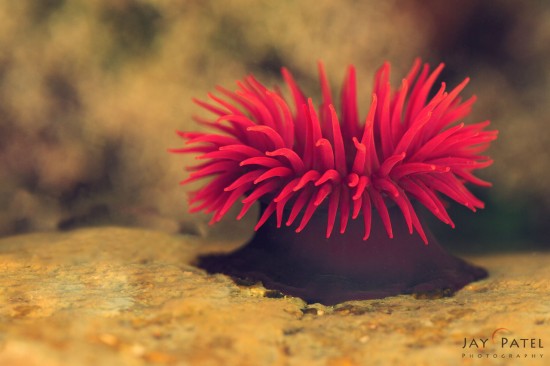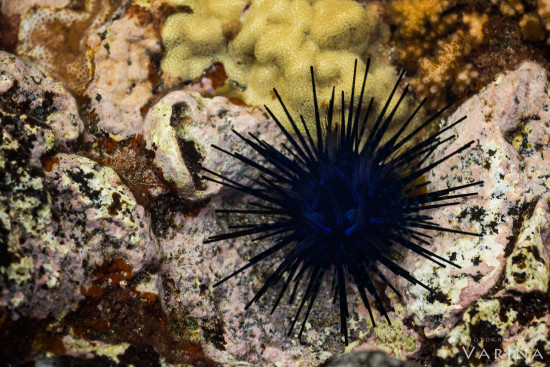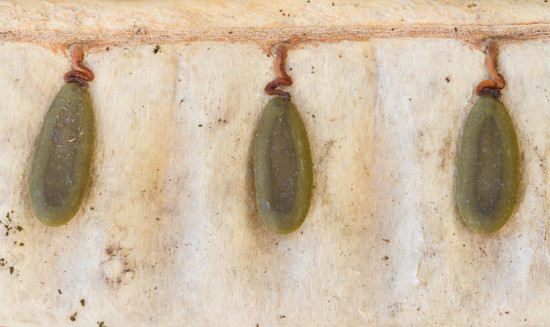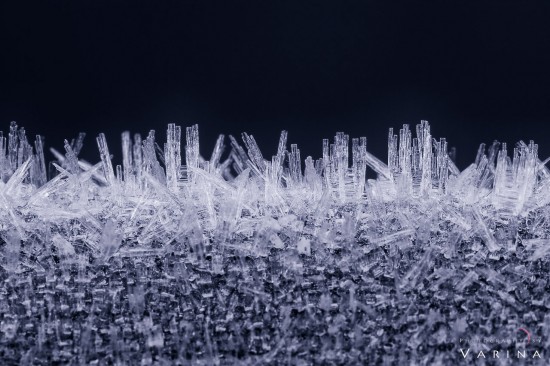While Jay was photographing a huge waterfall nearby, I went exploring in Rickett’s Glen in Pennsylvania. Along the cliffs near the falls, I found thin streams of water that created tiny, smooth waterfalls. They were every bit as beautiful as their big brother upstream and made for a unique macro photography subject.
I love macro photography because of details like this. There were crowds of people around those thundering falls. Every one of them was snapping photos with their cameras or mobile phones. But nobody seemed to notice this little beauty nearby. It was smaller. Quieter. More subtle. The showy falls got all the attention – but this one was no less beautiful for not calling attention to itself.
So here are our tips for finding macro photography subjects:
- Take a shot or two of the showy icon to get it out of your system – and then move on. This will help you focus your attention on your search for macro subjects.
- Get down low and look under things. Think of it like a treasure hunt. You are looking for interesting macro photography subjects that stand out against their background. I found my subject for this shot under a ledge of rock on the wall of the canyon.
- Pay attention to color and light. In this case, I loved the way the stream of water collected light and shadow and stretched them out like taffy.
- Look for interesting textures and patterns through your macro photography lens. This will help you notice details that might not stand out to your naked eye.
Your options for macro photography subjects are endless. However, once you do find an interesting macro photography subject, it is important to slow down and look closely at the details around you… and don’t let the biggest and loudest subjects get all your attention! If you’re willing to take the time, you’ll find yourself enchanted by the miniature landscapes all around you.
Macro Photography in Tide Pools
Macro photography subjects can be found just about anywhere. One of my favorite places to find macro subject is in shallow tide pools on a beach.
I am mesmerized by tide pools and can spend hours walking around on the beach looking at all the small sea creatures living in each one. The right tide pools can provide some stunning subject matter for macro photographers. The trick is to find the tide pools with the most interesting sea life. Here are Varina’s awesome tips for finding the best tide pools for photography.
Seed Pods in Hawaii
I discovered an interesting little seed pod lying near the road as we returned from a hike in Hawaii. Because I loved the patterns and details in the tiny seeds, I set up the shot on the bumper of the rental car. I got in close with my macro lens to eliminate distracting background elements.
I know. That seems obvious. As a pro, you’d think I’d know better. And yet here I stand… guilty of not looking closely before I took this macro shot on the big island of Hawai’i.
I was in a hurry to get the shot and I didn’t do what I am always telling my students to do. Just take a moment to look closely! The result? Lots of cloning work in Photoshop that could have been avoided. A few quick strokes with a small brush would have removed all the dust from this little seed pod. Here’s what it looked like before I cloned out the dirt.
Luckily, it didn’t take me long to do the cleanup. I used Photoshop’s Patch and Spot Healing Brush tools to eliminate bits of dust and dirt very quickly. My stylus and Wacom Intuos5 tablet gives me precise control as I’m working, which is invaluable for this kind of correction. I zoom in so that I can see the dirt clearly, and then I can tackle those little nasties one at a time.
Ice Crystals Macro
It would have been a lot quicker to take care of this in the field. So when I photographed the following beautiful ice crystals in New Zealand I took my time to slow down and think about just how I can get macro shot I wanted.
I took this shot in New Zealand on a freezing cold morning. Frost covered everything – from the boardwalk and benches to the grasses and flowers. To me, these tiny ice “sculptures” looked like a post-apocalyptic cityscape… the buildings toppling one after another. It was so incredibly peaceful out there. Completely silent except for the call of the ducks and the crunch of ice under our feet. If not for the fact that I couldn’t feel my fingers after a while, I would have been happy to stay right there all day long. 😉
I used my 180mm macro photography lens to get in close – and then closer – until those tiny ice crystals seemed to fill the frame. I wanted an incredibly narrow depth of field. Just a few millimeters of focus to show off that “skyline”, while blurring the ice crystals in front and behind.
- Macro shots are a heck of a lot easier with the help of a tripod and a good ball head. If your ball head slips, it’s going to drive you crazy… tiny subjects will disappear from your frame with even a small shift. Make sure your ball head is nice and tight, and take the time to adjust your composition until it’s exactly where you want it. And then, be careful not to bump that tripod. 😉
- Be sure your focus is exactly where you want it. I use the live view setting on my camera to get a good look at my subject – and then I zoom in to 5 or 10x while focusing. I use auto focus if I can, but there are times when manual focus works best. If the camera is “hunting” for your subject, switch to manual.
So, slow down and look closely at the details around you… and don’t let the biggest and loudest subjects get all your attention! If you’re willing to take the time, you’ll find yourself enchanted by the miniature landscapes all around you.
Visual Wilderness https://ift.tt/2sv5knq
Sourced by Time Trap Photography sharing the best photography tips, news and tricks throughout the industry. Time Trap Photography is dedicated to freezing those special moments in life that can be revisited and admired for generations to come. - Shannon Bourque
Please visit our main site for booking availability and rates.

Receive valuable industry knowledge delivered free to your email each day.














No comments:
Post a Comment
Thank you so much for your comment. A moderator will review and approve all relevant posts. We appreciate your support and encourage you to stay with us by subscribing to our email updates. Where you can easily pick and choose what photography subjects interests you. Subscription link: http://bit.ly/photo-sub